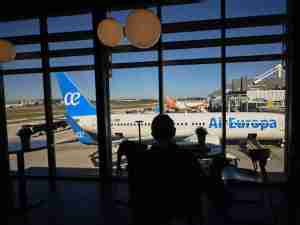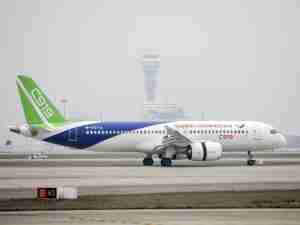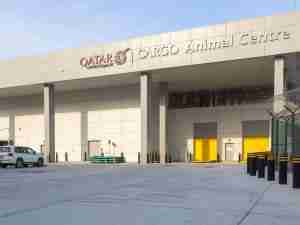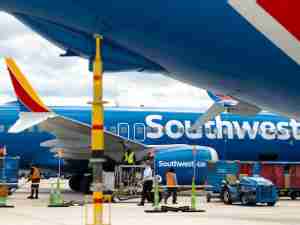Britons bound for sunnier climes over the next few days are bracing for renewed travel chaos as staff shortages and infrastructure snags threaten long delays for airline, ferry and and cross-channel train passengers.
Last weekend saw scenes of near meltdown at the Port of Dover and Manchester airport in northern England, as the first weekend of the Easter-vacation period brought a massive increase in passenger traffic to facilities unable to cope due to worker and equipment shortages.
The three days beginning Friday promise to be even busier, and there’s no guarantee it’ll go smoothly. Between Monday and Thursday, more than 300 flights, or 3% of all departures to or from the U.K., were canceled, according to aviation consultancy Cirium. A new problem popped on Friday with Eurostar departures from London St. Pancras delayed by up to 30 minutes.
A second wave of vacationers heading out will put understaffed check-in desks and security scanners under renewed strain, while other travelers will return home, increasing the workload for Border Force officials and adding to pressure on already stretched baggage-reclaim systems.
Airport chiefs said the situation may improve as more employees clear the 10-week screening process for recruiting to so-called airside roles, while ferry capacity at Dover has been swelled by the arrival of extra vessels.
At the same time, companies said they can’t promise that last weekend’s turmoil won’t be repeated, telling customers to arrive early and warning that they may need to stand in line for hours.
Concern about delays has spread to the government and regulators, with the Civil Aviation Authority writing to airports and airlines to warn that disruption has reached such a level that it risks putting people off travel at a critical time.
“Instances of late-notice cancellations and excessive delays at airports are not just distressing for affected consumers but have the potential to impact confidence levels across the industry, at just the point when passengers are returning to flying,” the CAA said.
The body’s chief executive officer, Richard Moriarty, said companies must ensure they have the necessary level of appropriately-trained and cleared staff and that timetables are deliverable.
Here’s a breakdown of what travelers should expect:
Dover
P&O Ferries services that usually transport cars and trucks to Calais remain suspended after the company fired almost 800 workers at short notice and with no consultation, triggering a spat with the government.
Some travelers suffered nine-hour delays last weekend as the ferry fleet halved in size as a result of the dispute and with ships from other operators laid up.
DFDS A/S has accommodated P&O ticket holders over the last three weeks but says Easter demand is so strong that it won’t be able to do so this weekend, even after bringing back two vessels and adding extra trips between Dover and Dunkirk, France.
There were diversions and road closures leading up to the port after 20 miles of highways were closed off to accommodate long queues of trucks. In a further development, U.K. customs officials were seeking to resolve issues with an IT system that’s adding to long delays for freight traffic trying to cross the Channel.
Read More: U.K. Brexit Border IT System Plagued by Outages as Queues Build
The problem has been fixed but still needs testing, and the system should be fully operational by Monday, HM Revenue & Customs said in an emailed statement.
Dover District Council’s leader said he’s prepared to declare a major incident if traffic disruption continues in the town into the weekend, a move that would “trigger a more robust response” from authorities. The port said it handled 30,000 departing passengers last weekend.
London Airports
Discount airline EasyJet Plc had to cancel flights at short notice last weekend following an outbreak of Covid-19 that propelled staff sickness levels to twice the normal rate.
Around 60 services were scrapped at airports including London Gatwick, and the carrier has since pulled the plug on some operations in advance and rebooked people onto alternative flights. More than 110 services will be affected over the weekend, according to a spokeswoman.
British Airways trimmed its schedule ahead of the Easter break, paring back through the end of May as staff shortages and Covid-19 infections threatened to disrupt operations during the spring travel peak. It has also battled technology issues.
BRead More: British Airways Slows Flight Ramp-Up on New-Hire Logjam
London’s Heathrow hub, the busiest in Europe prior to the coronavirus pandemic, faces the biggest passenger load since March 2020 over the Easter holidays, with up to 125,000 people traveling through each day.
Last weekend saw queues of departing passengers. A spokesman said the situation could ease this weekend and that there are currently no issues at security, though airline check-in is taking longer as travel to two-thirds of locations requires checks on Covid documentation.
Manchester Airport
The epicenter of Britain’s Easter travel meltdown, Manchester has been suffering a staffing crisis for weeks and made the front pages of British newspapers after waiting times to clear security last weekend stretched to seven hours, with terminals packed and lines snaking into the street.
A spokesman said the biggest crunch concerns baggage scanners, which can only be manned by staff who clear vetting, undergo rigorous training and show an aptitude for a job whose focus is partly to thwart terrorist attacks.
Baggage collection has reportedly taken three hours or more, causing some arriving passengers to abandon their luggage and collect it the next day. About 80,000 people passed through the airport last weekend.
Manchester Airports Group Chief Executive Officer Charlie Cornish apologized to customers for the situation, saying the company had had to let employees go to survive the pandemic and the timing of the recovery had been clouded by the omicron outbreak of the virus before a “stunning” rebound since February.
Eurostar
Eurostar International suffered a technical fault with a train Friday morning that caused knock-on delays of up to 30 minutes.
Services should gradually return to a normal schedule, with all delays over for tomorrow’s departures, a spokeswoman said, with trains expected to be very busy.
The company, which has been ramping up its schedule, added more services on Wednesday. It now is running 13 daily return trips from London to Paris and six to Brussels, of which three go on to Amsterdam.











